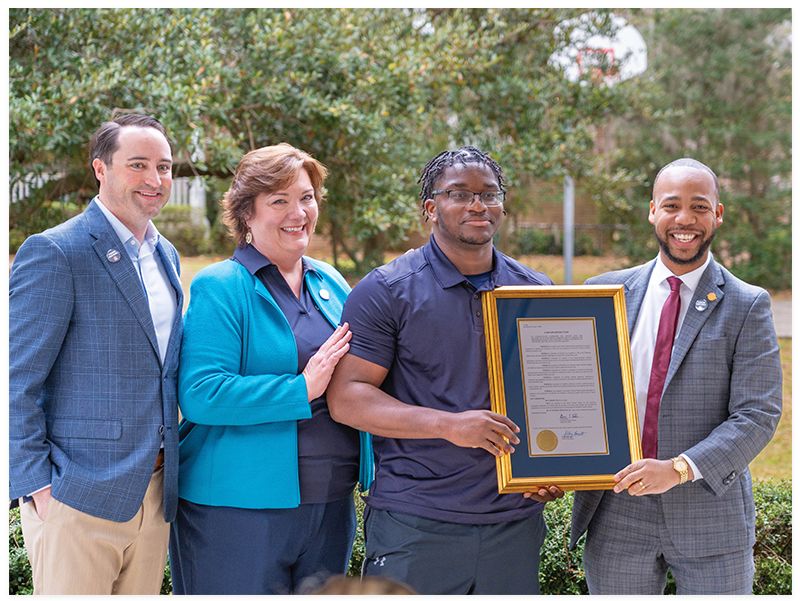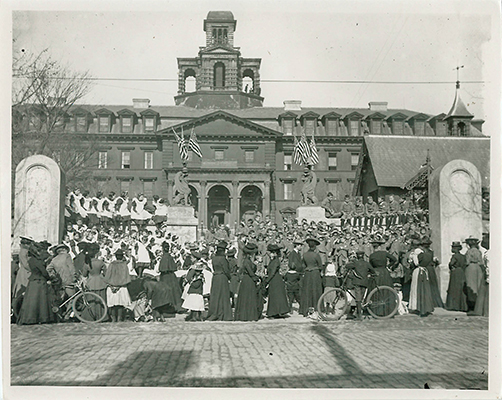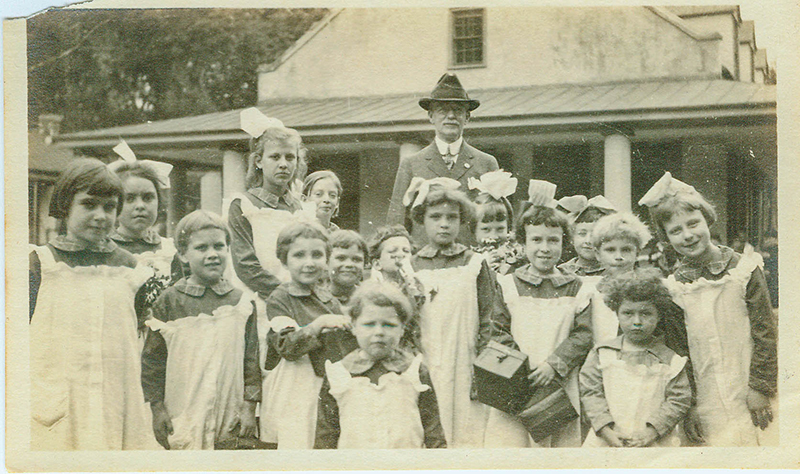The nonprofit hosts its biggest fundraiser, the 20th-annual Night for the Children Gala, on March 6

Board chair Peter Barton, CEO Beverly Hardin, alumnus Jacoby Burgess, and SC Senator Deon Tedder were on hand last year when the nonprofit announced its new name to reflect its range of support services and efforts to keep children with their families.
Births, graduations, marriages—these are the moments for which greeting cards are made. But Landmarks for Families (LFF) understands that big milestones also exist during crises and complications that place caregivers and children at a crossroads. “We’re not just an orphanage; we’re a turning point for families,” explains chief executive officer Beverly Hardin, whose team helps change the trajectory of families struggling with homelessness, abuse, neglect, and abandonment. “To those people, we say, ‘Today, you are where you are. Tomorrow, you can rewrite the story.’”
As an organization, LFF has also rewritten its story over the past 235 years. From its beginning in 1790 as the country’s first municipal orphanage to a 1981 merger forming the multiservice agency Carolina Youth Development Center to its newest iteration as Landmarks for Families, the nonprofit has adjusted in the face of challenges, just like those whom it serves. “Over two centuries, the child welfare system has seen a lot of changes,” says Hardin. When she became CEO in 2017, “the statistics around foster care reflected doom and gloom,” showing kids ill-equipped to graduate high school or hold a job. “Placing children in residential programs had become the easy fix, even if it wasn’t the right fit.”

Landmarks for Families orginated in 1790 as the Charleston Orphan House (above), the country’s first municipal orphanage.
Rather than continue removing children from their homes, LFF decided to work to keep families together during times of struggle by resolving problems from the inside. “Kids are a reflection of where they come from. We want to be a light in those dark corners,” Hardin says.
Thanks to partnerships with the South Carolina Department of Social Services, educators, and law enforcement, plus a $5-million annual budget, LFF provides a “comprehensive continuum of care.” These layers of support include in-home coaching, community classes, and group shelters. “Every family has a different story,” says Hardin, “but neglect often relates to poverty.” Perhaps the parents have fallen victim to predatory schemes like rent-to-own models that sap their budget, or they never learned to properly grocery shop. Maybe the caregiver struggles to balance a job, a family, and an education. “They’re trying so hard but can’t make it work.” LFF staff teaches families how to gain control by assisting with the math behind bills, finding new resources, and creating structure. “Parenting is harder than ever. Trying to build a healthy home isn’t an easy charge,” continues the CEO. “Sometimes, you just need somebody to walk it out with you.”

The nonprofit is one of three organizations statewide to implement the “teaching family” model that shows adults how to manage a child’s behavior and emotions. With the support of the Duke Endowment, they are also piloting a reunification program to help transition children back into the home or care of a family member. As part of that effort, coaches assist with navigating cultural differences, establishing new rules, enrolling in school, and any other adjustments. And when children need a safe place to stay and heal, LFF offers residential group homes and shelters on its campuses in North Charleston and Moncks Corner.

Erin Kienzle with North Charleston Mayor Reggie Burgess at the 2024 Night for the Children Gala.
Over the past year, LFF has also served 1,100 families through parenting classes, relationship-building workshops, support groups, family therapy, and summer literacy camps. The peer grief support group LYGHT (Listening and Led by Youth in Foster Care: Grief, Hope, and Transitions) has gained attention from the California Evidence-Based Clearinghouse for Child Welfare for successfully helping teens and young adults recover from trauma and loss. “We use the best tools to make meaningful changes,” says Hardin. “We want to walk away knowing that a family is better off because of us.”
Support the Cause: Landmarks for Families hosts its biggest fundraiser, the 20th-annual Night for the Children Gala, at Francis Marion Hotel on March 6 from 6 to 10 p.m. Visit landmarksforfamilies.org for information.